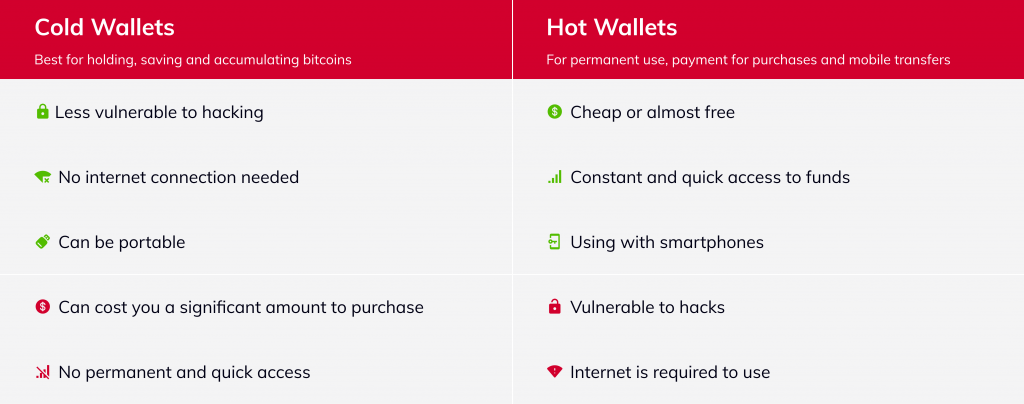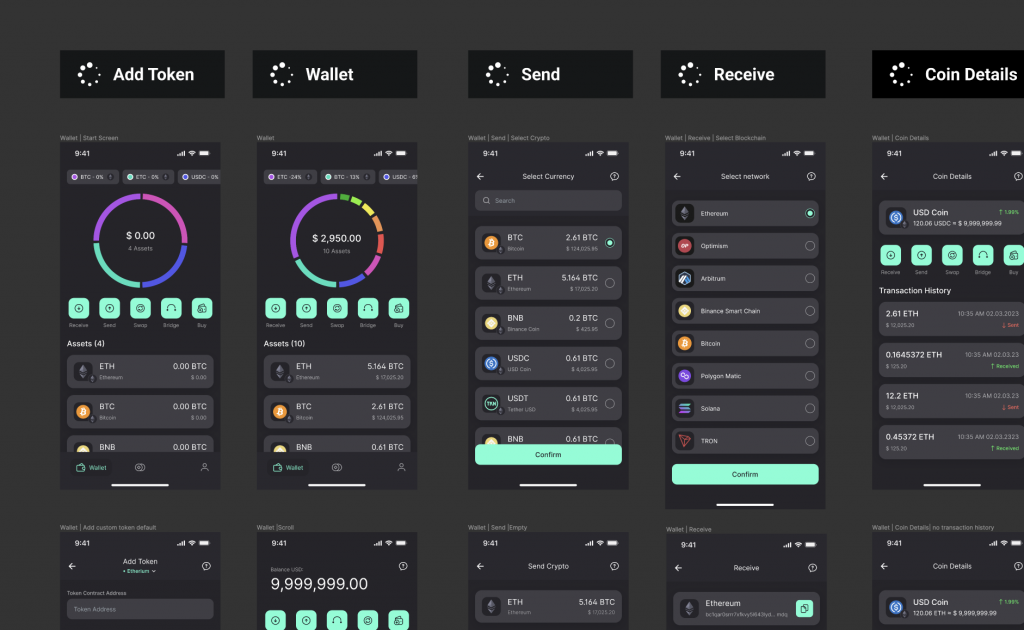Want to develop a crypto wallet app? By 2030, the Global Cryptocurrency Payment Apps market is projected to reach over $2.108 million, growing at a CAGR of 18.52% over the next eight years (Research and Markets).
A staggering 290% increase compared to previous years is mainly driven by the widespread adoption of cryptocurrencies, market strengthening due to recent ETF approval, and wider adoption of cost-saving payments provided by layer-2 solutions. Realizing the future perspectives of cryptocurrency and its lucrative opportunities for business development, many companies already started investing in digital crypto projects.
For example, we have built Dollet Wallet – a non-custodial crypto wallet that features seamless asset management and multi-chain compatibility. Thanks to this project, we know all the ins and outs of blockchain wallet development and can discuss them with you.
In this guide, IdeaSoft developers will introduce the basics of how to create a crypto wallet app for your business. You’ll discover the core essentials of crypto wallet app development, the basic features, and the step-by-step strategy that will help you build a scalable and functional crypto application. With our crypto wallet development services, we design and build your wallet from the ground up: from intuitive multi-currency UX to strong key storage, biometric login, and blockchain integrations.
IdeaSoft has the expertise and a full-cycle product team on board!
Looking for an experienced team of crypto wallet developers? Let our experts share key insights on developing a custom digital solution and explain the common development challenges to help you successfully plan your crypto wallet project.
Table of content:
- Why to Develop a Crypto Wallet Application?
- What Are the Types of Crypto Wallets?
- Essential Features in Crypto Wallet Apps
- 8 Fundamental Aspects for Developing a Cryptocurrency Wallet App
- Our Experience in Crypto Wallet Development
- Key Challenges in Cryptocurrency Wallet Development
- Summary
Why to Develop a Crypto Wallet Application?
We distinguish 4 reasons why it makes sense to start crypto wallet app development:
- Riding the wave of market growth. Startups develop a crypto wallet app to enter a growing market. This not only opens avenues for substantial revenue through transaction fees and premium features but also offers opportunities for innovation and brand establishment in the competitive fintech space
- Promoting financial inclusion. Cryptocurrencies offer a unique solution to the challenges faced by unbanked and underbanked populations. By developing a crypto wallet application, developers contribute to financial inclusion, providing access to financial services for those who lack traditional banking facilities. Crypto wallets facilitate global transactions without the barriers imposed by traditional banking systems, thus fostering economic participation across diverse demographics.
- Contributing to economic growth. Developing a crypto wallet application not only benefits individual users and businesses but also contributes to the overall growth of the cryptocurrency ecosystem. By fostering innovation and encouraging new technological developments, developers play a crucial role in advancing the blockchain space and supporting the global economy’s digital transformation.
- Seizing market differentiation. By offering unique selling points such as advanced security measures, user-friendly interfaces, and additional services like DeFi integration, developers can set their crypto wallet applications apart from the competition. Strategic partnerships with other fintech and blockchain companies can also enhance the application’s value proposition, attracting a broader user base.
Overall, startups, end users (cryptocurrency holders), businesses, merchants, investors, and traders benefit from crypto wallet app development.
What Are the Types of Crypto Wallets?
The functionality and technologies required for the crypto app development will mainly depend on the type of wallet you choose. So, the first stage in understanding how to develop a crypto wallet is to identify what type of wallet can better match the app’s features, project requirements and needs. This table highlights the main differences between cold wallets and hot wallets.

And here is a comparison table with the different wallet features we recommend you investigate before you decide to develop Bitcoin wallet application.
| Feature | Cold Wallets (Hardware Wallets) | Hot Wallets | Hybrid Wallets |
| Definition | Physical devices designed to store cryptocurrency offline. | Software-based wallets connected to the internet. | Combine elements of both cold and hot wallets. |
| Security | High – private keys isolated from the Internet, resistant to online hacks. | Lower – requires an ongoing Internet connection, more vulnerable to online attacks. | Enhanced – majority of funds stored offline, small portions kept online. |
| Accessibility | Limited – requires physical access to the device. | High – seamless access for active trading/transactions. | Balanced – offline storage for security, online for accessibility. |
| Usage | Best for long-term storage of large amounts of cryptocurrency. | Ideal for active trading and frequent transactions. | Suitable for users needing both security and convenience. |
The wallet type, however, is not the only aspect you need to develop a secure blockchain wallet application. Identifying the features and technologies of your future application will help you to create a cost-efficient and competitive solution for crypto payments. So, let’s review the most important features that can maximize the performance of your cryptocurrency platform.
Crypto Wallet Apps Features to Develop
Planning the app’s functionality is another essential aspect of such projects, as it allows you to understand the use cases and identify the benefits of your app compared to the existing market alternatives.
Below, we’ve outlined the most fundamental features in crypto applications, which you can apply to create a custom digital wallet app or even build your own crypto casino!
#1. User Authentication
An essential feature that enables wallet access only to authorized individuals. As a rule, user authentication is exceptionally important for meeting various crypto compliance standards such as AML, KYC, and others. Typically, it is implemented through secured login credentials, biometric authentication, or multi-factor authentication (MFA), which prevents third-party access to the crypto wallets.
#2. Support for Multiple Cryptocurrencies
Today, multi-currency apps have a strong competitive advantage compared to single-currency alternatives, like Bitcoin or Ethereum wallets. Integrations with various currencies can significantly improve the usability of your digital wallet app, making it more versatile and functional. Additionally, multi-currency crypto wallets allow asset holders to diversify their portfolios, which is important from both the business and the customers’ standpoints.
#3. Secure Blockchain-Based Transactions
Once you’ve decided to develop a crypto application, make sure to prioritize the security of your on-chain transactions and other cost-related operations. The transaction safety measures include but aren’t limited to encrypting sensitive data, verification of user accounts and signatures, and integrations of blockchain security protocol, etc.
#4. Integration with Payment Gateways
This feature enables users to perform the payments directly from their crypto wallets, through the integrated external payment processors or gateways for cryptocurrencies. Crypto-based technologies work similarly to the standard payment processor gateways and acquire bank credit cards and are commonly applied to make transactions more simple without compromising their security.
#5. Efficient Address Management
Powerful address management functionality allows crypto users to ease wallet address tracking and facilitate their identification. However, along with the technical aspects, developers also need to ensure the system provides a convenient design and user-friendly experience for managing crypto addresses.
#6. Integrations with the Paper Wallets
Importing paper wallets allows crypto holders to transfer funds between a physical paper wallet and the digital crypto wallet app. Yet, similarly to the crypto exchange security features, paper wallet integration should be handled carefully due to its high relevance to sensitive user information and financial data.
#7. QR Code Scanning
This function is mainly used to simplify the process of sending and receiving cryptocurrencies. Users can scan QR codes to input wallet addresses, conduct transactions, or log in to their crypto wallets through any mobile or desktop device. The QR code scanning integration is relatively straightforward and features plenty of established libraries and APIs available for developers.
#8. Automated Session Logout
This functionality can provide the add-on security layer for your digital wallet app, ensuring they’re safe and can be accessed only by authorized parties with specific permissions. Once the session is ended, the system will automatically log you out, confirming the safety of the in-app processes and crypto manipulations.
Got lost in tech details?
Contact us today to discuss how to create a crypto wallet app that empowers your business development and growth!
8 Steps for Developing a Cryptocurrency Wallet App
Now we would like to describe the basic steps for creating a crypto wallet app and give best practices for each step based on your experience.
1. Review the Latest Blockchain and Cryptocurrency Concepts
Keep track of the latest trends and technology updates in the blockchain and crypto landscape. This knowledge will provide a solid foundation during the actual development process. Revise the current Layer-2 solutions as far as they offer higher transaction speed with a relatively low gas fee.
At the current market state, we recommend turning your attention to Solana due to its ecosystem prominent growth and Polygon, due to the fastest implementation of the ERC-4337 token standard. This new level of technology allows for building a programmable wallets with smoother transaction flow and higher level of security at the same time.
Herman Stogniiev, Co-founder and CTO at IdeaSoft
Understanding the fundamentals of blockchain architecture, different consensus mechanisms, and the specific features of cryptocurrencies will help you maximize the performance of your project, ensuring its competitiveness in the long run.
2. Utilize Established Open-source Cryptocurrency Libraries
Leverage well-maintained, open-source cryptocurrency libraries like BitcoinJ for Bitcoin or Web3.js for Ethereum. These libraries have been extensively tested for blockchain-based product development and can significantly enhance the development workflow while ensuring reliable functionality and keeping your products secured.
3. Leverage APIs for Seamless Integration
Utilize reputable APIs provided by blockchain networks, which can provide high-level reliability and development support. These APIs offer standardized methods to interact with the blockchain, making the integration process smoother and more efficient.
4. Harness Cloud Technology for Scalability
By utilizing cloud platforms like AWS, Google Cloud, or Azure build a scalable crypto web app that always provides top-level user experiences. Additionally, leveraging the cloud solutions in crypto wallet applications enables businesses to effectively allocate computation resources based on user demand, providing a seamless performance even during peak usage.
5. Choose an Appropriate Technology Stack & Development Expertise
Select a technology stack and blockchain expertise that aligns with your project’s requirements and business goals. For instance, consider using languages like JavaScript (for web-based wallets) or Java/Kotlin (for mobile apps on Android or iOS). By choosing the databases, frameworks, and libraries that work best on the target operational system and device, you can provide the smooth and efficient performance of your crypto wallet app.
6. Strengthen Security Measures
As we mentioned earlier, security is the paramount component in cryptocurrency wallet development. Implementing industry-standard security practices like data encryption, secure key management, and secure coding practices can make your product more resistant to hacking attacks, leakages, and other threats. Additionally, secure and reliable systems will help your crypto wallet app gain recognition among larger audiences.
7. Analyze Market Competitors
Conduct thorough market research to understand the strengths and weaknesses of the existing crypto wallets. Identify the key areas where your product can stand out among the competitors with unique features or improvements. Use the results of your research to make data-driven decisions and build a powerful digital wallet for cryptocurrency.
8. Implement & Refine Your Application
After the app release, pay attention to the user feedback and adjust the functionality of your crypto wallet to meet the client’s needs. Continuous refinement and updates based on user input, as well as catching up with the latest industry innovations, will help you to ensure the product’s success from a long-term perspective.
Our Experience in Crypto Wallet Development
At IdeaSoft, our blockchain team features vast expertise in building digital wallet solutions for crypto. For each of the projects, we create a custom development strategy that is fully tailored to your project requirements and business goals.
For example, for one of our recent projects – Dollet Wallet – our experts have built a non-custodial crypto wallet that features seamless asset management and multi-chain compatibility. Along with a functional admin panel, the app streamlines processes for crypto storage, DeFi farming pool investments, and bridge-enabled asset transfer. Finally, this cryptocurrency wallet supports third-party service integration to enable the seamless in-app exchanges of crypto assets.

To maximize the project’s efficiency, our experts have created a data-driven development strategy based on the current market trends and target audience studies, yet included the core business goals and project requirements discussed with our client.
Key Challenges in Cryptocurrency Wallet Development
According to Rostyslav Bortman, the Head of Blockchain at IdeaSoft, the main challenge in crypto wallet development is the security of private key management on a device.
Crypto wallets utilize the device memory for private key storage, so developers must analyze the architecture and technical specifications of the hardware when building cryptocurrency wallet apps.
Along with the private key management, other important aspects in creating digital wallet apps include the app’s UI/UX design, its scalability, and blockchain development expertise.
- UI/UX Design. In the challenging landscape of Web 3.0 development, ensuring an outstanding user experience and seamless functionality can give you a serious advantage over the competitors. With an expert UI/UX team, you can create a user-friendly interface that ensures a seamless engagement with the key wallet services and functionality.
- App Scalability. As the user base and transaction volumes grow, you may need to scale your project to optimize its performance for larger traffic flow. So, once you decide to build a cryptocurrency wallet, make sure to consider its future development and growth strategy as well. Considering the scalability of your digital crypto wallet will help to optimize your application, extend its functionality, and integrate the newest technologies, which benefit both the client experience and the business as a whole.
- Blockchain Development Team. The development expertise is an essential component of your project’s success. For this reason, it’s important to hire specialists who are relevant to your project requirements and business goals. Additionally, it’s recommended to check the developers’ experience and discuss your expectations to ensure a productive and efficient collaboration.
- Regulatory and Legal Challenges. Adhering to evolving regulatory frameworks and legal requirements is crucial for your crypto wallet app development. Compliance with anti-money laundering (AML) and know-your-customer (KYC) regulations can be particularly challenging, as these requirements vary across jurisdictions and are subject to change.
- App Security and Safeguarding Measures. The cryptocurrency space is a prime target for hackers, and wallet developers must continuously adapt to evolving security threats. Our team always recommends implementing advanced encryption, and multi-signature authentication, and conducting regular security audits after each smart contract or even wallet software update.
When developing a cryptocurrency wallet, it’s also recommended to consider the right wallet type, including multi-currency support and specific in-app functionalities, which can enhance the app’s usability and facilitate user experience.
How much does it cost to develop a crypto wallet app?
The cost of cryptocurrency wallet application development is influenced by the desired feature set, complexity, chosen platform, and the location of the development team. For a basic wallet with features like storing a few cryptocurrencies and basic send/receive functionality, the estimated cost range is between $30,000 and $40,000. This is suitable for individuals or startups looking for a simple solution.
We always recommend our clients to start with a discovery phase, where we properly draw up requirements for the project and make proper estimates.
For a more moderate wallet that includes additional features like supporting a variety of cryptocurrencies and basic trading capabilities, the estimated cost increases to $50,000 – $80,000. For those seeking an advanced cryptocurrency wallet with features such as staking, DeFi integration, and an in-app exchange, the estimated cost may rise to $100,000 – $200,000.
Want to develop a crypto wallet application?
We can calculate the cost of wallet development based on your wishes. Just contact us!
This complexity level often demands the expertise of a full-cycle development team, such as IdeaSoft, which is capable of handling intricate functionalities and both iOS and Android platforms. The investment reflects the comprehensive nature of the features and the need for a more extensive and blockchain-specialized development team.
Summary
Choosing the right functionality, efficient strategy, and relevant expertise is essential for building a successful crypto wallet application. And, having uncovered the essentials of how to create a cryptocurrency wallet for your business, it’s the best time to get started on your project development with the professional blockchain team.
IdeaSoft is one of the leading blockchain companies with proven expertise in crypto app solutions development. Our team of dedicated blockchain developers, creative designers, professional project managers, and experienced business administrators will guide you through each stage of the project delivery, helping you to build the most efficient and effective solution for your company.
Incorporating restaking features can further enhance your wallet app by providing additional rewards and incentives for users. Contact us today to discuss how to create a crypto wallet app that empowers your business development and growth!

